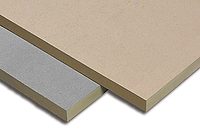BETHESDA, Md. — On Oct.31, 2013, the National Building Code (NBC) of Canada adopted the most recent version of CAN/ULC-S704-11, the standard specification for polyiso in Canada, which references the test method CAN/ULC-S770-09 for determining the long-term thermal resistance (LTTR) of polyiso foam insulation. This adoption brings consistency to the test methods used for measuring LTTR in Canada and the United States.
In the United States, polyiso manufacturers use the ASTM C1289 standard (ASTM C1289 Standard Specification for Faced Rigid Cellular Polyisocyanurate Thermal Insulation Board) to predict the long-term thermal resistance R-value for a variety of polyiso insulation boards. ASTM C1289 includes the CAN/ULC-S770-09 and ASTM C1303-12, another test method used for LTTR.
“Since our members make and ship product in the United States and Canada, it is critical that polyiso insulation be subjected to the same criteria for measuring LTTR in both countries,” said PIMA President Jared Blum. “We are pleased that the NBC in Canada has adopted CAN/ULC-S704-11 and CAN/ULC-S770-09, and that it is in harmony with ASTM C1289. Together these standards provide more data for predicting the long-term thermal performance of polyiso insulation and further enhance the validity of PIMA’s QualityMarkCM program.”
The PIMA QualityMark program, the only third-party program for the certification of the thermal value of polyiso insulation, allows polyiso manufacturers to obtain independent, third-party certification for the LTTR values of their polyiso insulation products. Polyiso is the only insulation to be certified by this unique program for its LTTR value. The program was developed by PIMA and is administered by FM Global.
To participate in PIMA’s QualityMark certification program, a Class 1 roof is suggested to have a design R-value of 5.7 per inch. PIMA member manufacturers will publish updated R-values for their polyiso products later this year. Polyiso is unique in that the R-value increases with the thickness of the foam, so 3 inches of polyiso has a higher R-value per inch than 2 inches.
For more information, visit www.polyiso.com.







